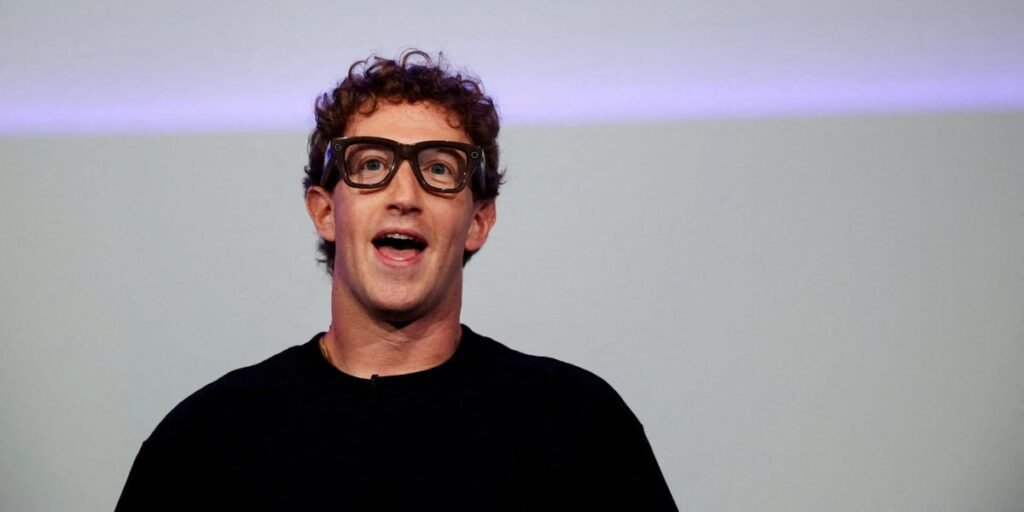Meta’s new collection of AI-powered wearables will let you subtitle your life, text discreetly, and surf in style.
CEO Mark Zuckerberg pitched AI-powered wearables as the next must-have item at Wednesday’s annual Meta Connect.
“Glasses are the ideal form factor for personal super intelligence because they let you stay present in the moment while getting access to all of these AI capabilities to make you smarter, help you communicate better, improve your memory, improve your senses,” said Zuckerberg as he took the stage in Menlo Park.
The announcements confirmed a leaked video from Meta on Monday, which teased a neural wristband for the Ray-Ban Meta glasses and a sport-focused model of the Oakley Vanguard smart glasses.
Meta shares gained moderately in after-hours trading, up half a percentage point at the close of Zuckerberg’s keynote speech.
These are the four biggest product announcements out of Meta Connect, plus a big tech snafu:
1. A stepping stone to Orion glasses
The relatively affordable Ray-Ban Meta glasses, which start at $299 and have already sold over 2 million units, will be upgraded with a new display and a neural wristband with surface electromyography.
The display glasses will include a full-color in-lens display for tasks like messages, photos, and Meta AI prompts, with built-in cameras and audio and up to six hours of battery life.
“These are the original, iconic designs. I think these are the most popular glasses design in history,“ Zuckerberg said, referring to the Ray-Ban model.
“I wear them all day, they never run out of battery,” he added.
The glasses, developed in partnership with EssilorLuxottica, will launch in two frame sizes and colors starting September 30 at select US retailers, including Best Buy, LensCrafters, and Ray-Ban stores, with a price tag of $799 for the set. The rest of the world could see a gradual rollout by early 2026.
The pricing is seen as a gradual ascent toward Orion AI glasses, which are not publicly available. Zuckerberg previously said the augmented reality-focused Orion would cost $10,000 to make per pair.
2. The neural wristband
The glasses’ complementary wristband can detect muscle motions and may be able to detect subtle finger movements that would allow you to type and control your glasses.
Zuckerberg called the neural band a “huge scientific breakthrough” and added that it is available in various colors, is water-resistant, and has an 18-hour battery life.
In a live demo, Zuckerberg showed audiences how he used the wristband to type and send WhatsApp messages to Meta’s chief tech officer, Andrew Bosworth.
3. ‘Era of athletic intelligence’
You may be in luck if you’re both a fan of tech and high-intensity sports.
Meta unveiled a new line of performance-focused AI glasses designed in partnership with Oakley. The new product, named Vanguard, is available for pre-order ahead of its October 21 launch.
“I’ve taken them out surfing,” Zuckerberg said.
Meta said the Vangaurd would adopt Oakley’s wraparound design, with a lens that blocks out dust and sun, alongside the most water-resistant frame among all Meta glasses.
According to Meta, an athlete who has a Vanguard and a compatible Garmin-branded device could ask its AI system what their heart rate or speed is and use voice commands to get feedback on their performance. The glasses allow users to capture video hands-free in up to 3K resolution.
4. Meta’s new VR feature
At Connect, Zuckerberg unveiled an upgrade that allows users of its Quest headset to scan a room in a few minutes and explore it.
The scan creates what Zuckerberg called “immersive, true-to-life virtual experiences” with realistic physics and interactions. “It’s pretty awesome,” he said at the conference.
The feature, first announced last year, is available to developers and creators. It’s part of Meta’s long-running plan to build realistic digital worlds — what it calls the Metaverse — that people live and interact in.
5. Live demo glitches
Meta’s big unveiling of its next wave of AI-powered glasses was overshadowed by awkward live demo failures.
When Zuckerberg introduced the second-generation Ray-Ban Meta glasses and projected chef Jack Mancuso on the big screen to showcase the glasses in action, things went sideways.
The AI skipped steps, ignored follow-up questions, and repeated itself when asked to provide instructions on how to make a Korean-inspired steak sauce. Mancuso blamed it on a “messed up” WiFi connection.
The setbacks continued when Zuckerberg attempted to demo the neural wristband. After typing a message to Bosworth, Zuckerberg tried to answer a live video call, only to fail multiple times as the wristband didn’t respond. Bosworth eventually joined him onstage to say that the “WiFi is brutal.”
“You practice these things like 100 times, and then you never know what’s going to happen,” Zuckerberg said.


